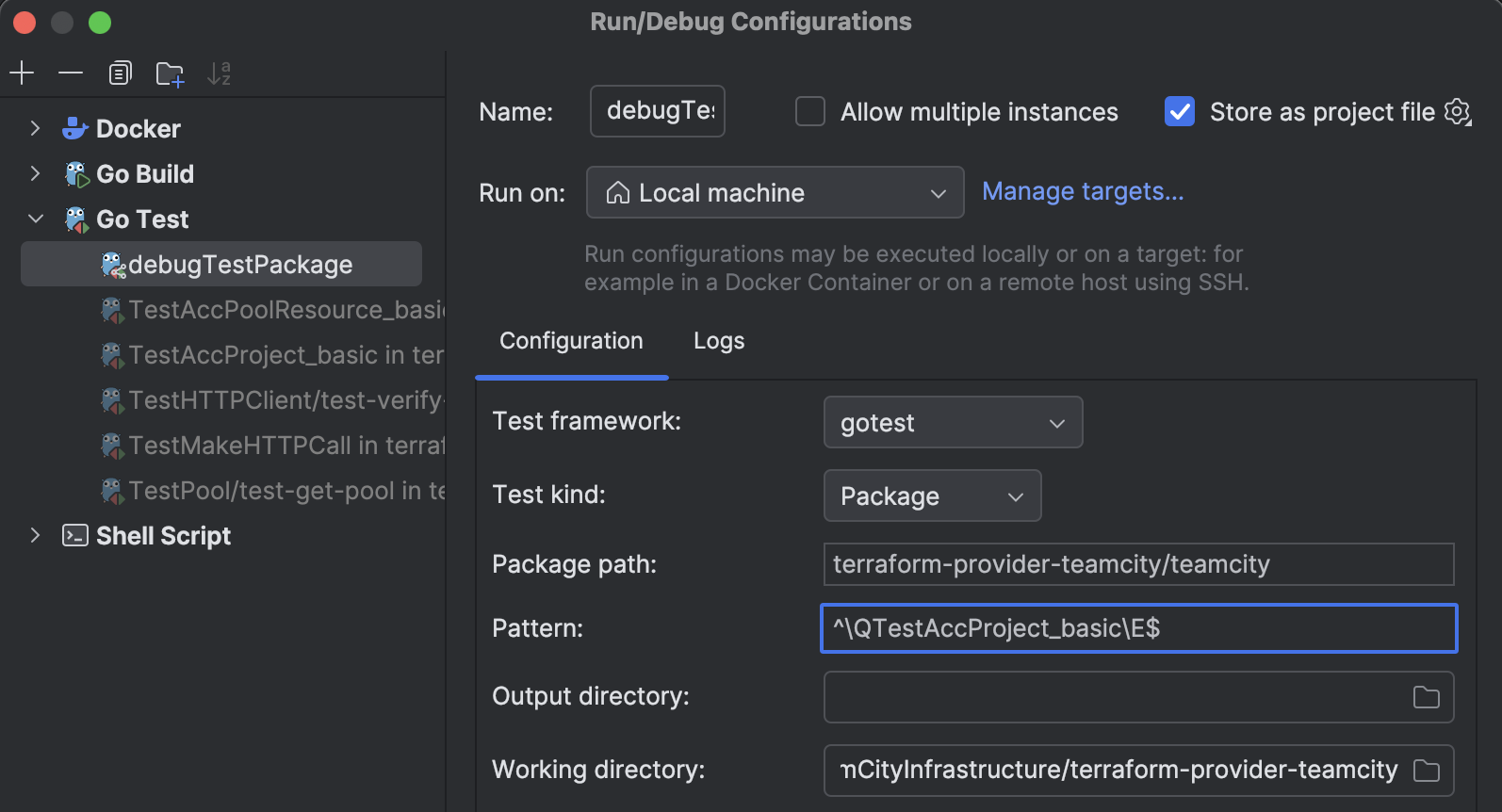This provider leverages the HashiCorp Terraform infrastructure as code approach to allow DevOps engineers to initialize the JetBrains TeamCity server and automate its administration.
TeamCity Terraform provider supports Terraform 0.13 and newer.
The TeamCity Terraform Provider allows you to:
- Manage global server settings (server URL, maximum artifact size, VCS polling interval, and more)
- Set up routine server operations like cleanups and email notifications
- Create and manage users, user groups, and permissions
- Set up licenses and authentication modules
See the Documentation for the complete list of available resources and their fields.
In addition, you can include blocks that initialize and set up TeamCity projects, VCS roots, and more. However, be aware that the same operations are also available to project administrators via Kotlin DSL configuration files.
We recommend setting some ground rules for your workflow to enforce a single source of truth and avoid conflicting settings from
.tfand.ktsconfigurations. For example, you may want to utilize the Terraform Provider only for the initial TeamCity server setup and global administration, whereas individual projects are managed using Kotlin DSL.
Add the TeamCity Terraform Provider to the required_providers block of your configuration and specify valid credentials as follows:
terraform {
required_providers {
teamcity = {
source = "jetbrains/teamcity"
}
}
}
provider "teamcity" {
host = "http://localhost:8111"
token = "env.TEAMCITY_TOKEN"
}host— the URL of your TeamCity servertoken— the TeamCity Access Token issued for a user who has sufficient permissions to manage users, projects, and the server itself. It is recommended to store this token in an environment variable instead of passing it as a plain string value.
Refer to our Documentation for available resources and configuration samples.
For more advanced examples, see the /examples/ folder:
-
examples/1-server_settingsBasic TeamCity server configuration with built-in and GitHub App authentication, GitHub connection and simple clean up rules.
-
examples/2-permissionsThis example demonstrates how to configure Role and User group for a Project
-
examples/3-projectA TeamCity project with Versioned Settings enabled, VCS root with SSH key and a waiter script to wait for Kotlin DSL to be compiled and applied to the project
-
examples/4-moduleExample with a module used for creating several similar Projects
-
examples/5-clone_reposCreate a new GitHub repository from existing template and add corresponding Project to TeamCity server.
-
examples/6-read_reposImport all existing GitHub repositories in organisation to TeamCity server creating corresponding Project for each fo them.
-
examples/7-import_resourcesImporting existing resources from a running TeamCity instance.
These samples rely on existing GitHub organisation, so, they are not easily runnable as is, since the custom GitHub app cannot be re-used, and GitHub provides no API to create it automatically. Also, all used repositories are created in teamcity-terraform-test organisation.
This project is licensed under the Mozilla Public License 2.0. For more information, please see the LICENSE file.
- Run TeamCity server of preferred version via docker-compose.yml file. It should start a TeamCity container with pre-defined token. (There is a
tc-serverrun configuration) - Open the
DebugProviderrun configuration and make sure the correct module is chosen:
- Execute in debug mode this
DebugProviderrun configuration. You will see something like:
Provider started. To attach Terraform CLI, set the TF_REATTACH_PROVIDERS environment variable with the following:
TF_REATTACH_PROVIDERS='...'
- In the
examples/0-empty_developmentfolder export thisTF_REATTACH_PROVIDERSenv variable and you can useterraform plan/apply, you dont need to runterraform initbecause it already knows where to get the provider plugin part.
docker compose up -d --wait --wait-timeout 1000
export TEAMCITY_PASSWORD=token123
export TEAMCITY_HOST=http://localhost:8111
export CGO_ENABLED=0
export TF_ACC_PROVIDER_NAMESPACE=jetbrains
export TF_ACC=1
go test -count=1 -v ./...There is a GoLand run configuration where you can debug a test package or chose a specific test to run using Pattern like ^\QTestAccProject_basic\E$:

When TeamCity server is running, use Run Swagger UI configuration and go to http://localhost:8080/